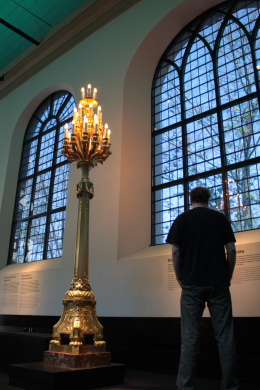 The Wiki Loves Art photo competition kicked off with an event held at the Joods Historisch Museum (JHM, Jewish Historical Museum) in Amsterdam yesterday. Museum director Hetty Berg explained that they had become enthusiastic about the idea of a photo hunt for Wikipedia after hearing about the positive experiences had by the Jewish Museum in New York during the precursor of this event in the US and the UK, Wikipedia Loves Art. She went on to highlight some of the objects that could be photographed, pointing out what made these objects special, which I thought was really helpful in portraying these objects.
The Wiki Loves Art photo competition kicked off with an event held at the Joods Historisch Museum (JHM, Jewish Historical Museum) in Amsterdam yesterday. Museum director Hetty Berg explained that they had become enthusiastic about the idea of a photo hunt for Wikipedia after hearing about the positive experiences had by the Jewish Museum in New York during the precursor of this event in the US and the UK, Wikipedia Loves Art. She went on to highlight some of the objects that could be photographed, pointing out what made these objects special, which I thought was really helpful in portraying these objects.
Three professional photographers roamed the museum to help out the 40 or so amateur ones, and I know this certainly helped me. That was an excellent idea from the organizers! One tip I found useful and would never have thought of myself is to use a timed release when using a tripod under low light conditions. This helps the camera stop wobbling after you press the release button.
The first photos of yesterday’s hunt are slowly appearing at http://www.flickr.com/groups/wikilovesart/. I posted my first batch there yesterday, but they still haven’t appeared, so who knows how many are still waiting in a queue. If you are in the Netherlands or planning to visit, the competition runs the entire month of June, during which you can show up with your camera (and sometimes with your tripod and flash—check the rules) at any of the 36 participating museums.
Update: the rules of several of the museums have been added to their pages at the Wiki Loves Art website—some of the museums will only be accessible during guided tours for which you have to register. Regardless of the motives for this restriction I think on the whole this is a good idea. It means the photographers get professional guidance, and the museums get to build confidence about events such as WLA.
(Photo of a lamp that used to adorn stairs in the Hirsch building in Amsterdam. The museum’s own photography gives little indication of the size of these things, so I put myself in the frame for comparison. I will be posting my photos for this comp at a Flickr account I created for it instead of at the 24 Oranges one.)
 From the Strategic Plan 2010-2013 of the Dutch National Library:
From the Strategic Plan 2010-2013 of the Dutch National Library:
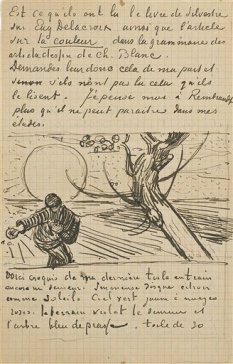 English translations of Vincent van Gogh’s letters to his brother Theo have been released in a 6 volume boxed set by the Van Gogh Museum in a 15-year-long cooperation with the Huygens Instituut. The original letters in French and Dutch have also been reproduced.
English translations of Vincent van Gogh’s letters to his brother Theo have been released in a 6 volume boxed set by the Van Gogh Museum in a 15-year-long cooperation with the Huygens Instituut. The original letters in French and Dutch have also been reproduced.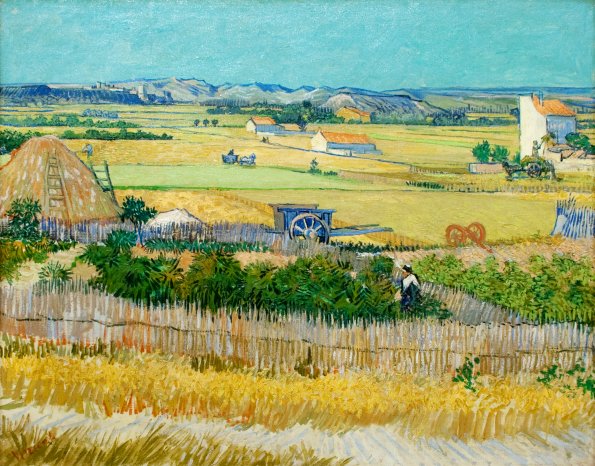
 The
The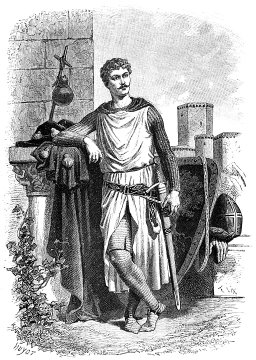 I’ve made a sampler of the Dutch texts that were published at Project Gutenberg in August and September. In a month I want to attend the
I’ve made a sampler of the Dutch texts that were published at Project Gutenberg in August and September. In a month I want to attend the 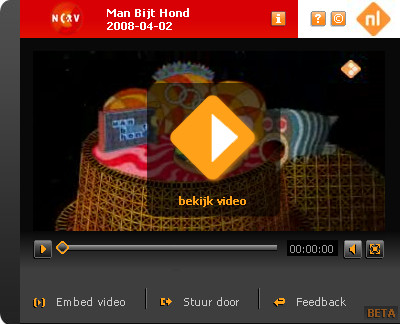 The united Dutch public broadcasters are considering introducing a YouTube like system for posting videos of shows
The united Dutch public broadcasters are considering introducing a YouTube like system for posting videos of shows